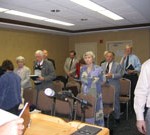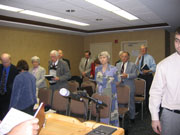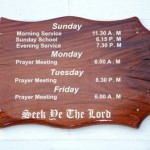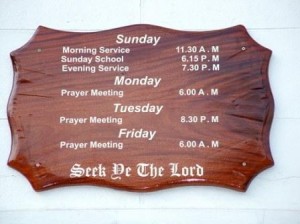 (Note: This post on church planting principles from Will Smith is from 2007… back when I thought I was going into church planting. A lot has changed since then!)
(Note: This post on church planting principles from Will Smith is from 2007… back when I thought I was going into church planting. A lot has changed since then!)
I’ll admit it….
When I was in Jr. High, I listened to DJ Jazzy Jeff and the Fresh Prince. My friend and I listened to all of his tapes (CDs were just coming out).
His rap was just what Junior High white boys in Montana liked: It was smooth, funny, and just a teeny bit rebellious.
I remember that some of the more serious, hard-core rappers gave The Fresh Prince a hard time for his music. “It’s not rap,” they criticized. “Real rap has edge. It’s angry. It’s not rap unless there is some profanity.”
The Fresh Prince took it all in stride, and just kept selling tapes. Then he got a TV Show and a few movie roles. Now, 30 years later, he can look at all those who criticized him and, with country-western singer Toby Keith, say “How Do You Like Me Now?”
The Fresh Prince, now known as Will Smith, is one of the most sought-after actors in the movie industry, not only in Hollywood, but in the entire world. TIME Magazine recently did a brief article on him and how he got where he is.
As I read it, I was amazed at what church planters (and all pastors and leaders) can learn from Will Smith.

In the December 10, 2007 issue of TIME magazine, there was an article about Will Smith and how this transformation occurred.
What is Will Smith’s secret?
One thing: Intentionality.
Will Smith says his success is all according to plan.
TIME reports that “Because Smith has mastered the delicate art of appearing artless, few moviegoers realize that his is one of Hollywood’s most meticulously planned and executed careers.”
He hatched his plan at age 16 after his first girlfriend cheated on him because (in his mind) he wasn’t good enough. He decided that he was never not be good enough again. He made a plan to correct this, and never looked back. You can see the plan unfold as you watch the career of Will Smith.
10 Principles of Success
But what interests me are ten principles he operates by to execute that plan. Here they are as gleaned from the article:
1. Don’t have a Plan B. Relentlessly pursue Plan A.
Smith says “By even contemplating a Plan B, you almost create the necessity for a Plan B.”
As church leaders, while it is often a good idea to make plans, I think we sometimes get derailed from God’s vision for our lives by naysayers and setbacks. But if all we have is Plan A, we will work at it wholeheartedly because there is no other option.
2. Read. Read. Read. Find your answers in books.
Will Smith has a library stocked with books on every topic imaginable. He reads and studies to find the answers he needs.
This reminds me of something Chuck Swindoll used to say: Readers are leaders.
3. Study what others have done, and emulate. Learn by watching others.
When Will Smith began his acting career, he would watch and emulate the various actors that came on the show, even mouthing their words after them when they rehearsed. Later, when he started to try to get into movies, he and his manager found a list of the 10 top-grossing movies of all time, and looked for patterns and similarities in them.
Church leaders can do this with churches, but we have to be careful how we define “success.” Big churches are not the most successful churches.
4. Be Friendly. Make contacts.
Will Smith had a knack for charming his way out of trouble and winning friends. This is how he met “DJ Jazzy Jeff” and later, James Lassiter, his manager.
Church leaders and planters cannot afford to be introverted. We must love to spend time with people.
5. Work hard. Be Diligent.
Will Smith has a good work ethic and works hard at everything he does.
Leading a church is not easy. It takes hard work and lots of sweat and tears.

6. Understand ideas, and which ideas move people.
Will Smith says that when studying movies, and which ones are popular, he tries to back up and get the big picture. “I look at movies in their essence,” Smith says. “Will that idea sell?” If you look at the movies Smith does, he always does movies that focus on an idea or a story that resonate with the vast majority of people on the planet. He is not just trying to entertain, he is trying to connect.
This is key for church planters. Too often we get caught up in the entertainment mode. But entertainment is fleeting; personal connections are forever.
7. Understand universal patterns.
This is related to number 6. Will Smith calls himself a student of universal patterns. He watches for movements in worldwide society and culture, and then tries to focus on these patterns. He and his manager sit down every Monday morning any analyze the box office numbers for the past weekend, as well as the past 10, 20, and 30 weekends. He is looking for trends and patterns.
We too can look for universal trends, needs, and patterns. Study history, culture, and relationships. These are the areas in which God is at work.
8. Think globally.
Will Smith doesn’t just want people in the US to see his movies. He wants to be a worldwide movie star. So after a movie debuts in the US, he travels to England, Germany, Japan, Brazil, China, and promotes his movies. This, of course, makes him popular with the movie producers because it is more money for them.
So also with church planting. While our first focus is our neighborhood, we must also develop a global perspective. See the excellent book by Bob Roberts on this: Glocalization: How Followers of Jesus Engage a Flat World.
9. Go where the people are.
Since Smith didn’t initially have worldwide recognition, he knew it would be hard to get a worldwide platform unless he went where people were already gathering. So when he travels, he travels intentionally. He promotes his movies in South Korea at the World Cup, in Brazil during Carnival, and is headed to Beijing for the 2008 Olympics. Why try to gather a crowd on your own when you can just use a ready-made crowd?
Churches often try to gather their own crowds, and they spend huge sums of money and large amounts of time to do it. Why not just go to wherever the crowds are already gathering in town?
10. Never neglect what is important: family.
This I though was the most amazing thing of all. Hollywood actors are not known for stable marriages, mostly because they are trying to follow their dreams and make it big. Smith has been married for 10 years and says, “Our first official date was with a relationship counselor. The math is simple. Start while it’s good. Do it three times a week while you’re laughing and still having fun. You get so much more work done. You head off problems. Do it during the ether time, and do it aggressively.” Smith knows that all of his fame and glory is nothing if he doesn’t have a his wife and kids to share it with.
Church planters and church leaders take heed! What good does it do to have a huge church if you lose your wife and kids in the process?
Conclusion
Most of these ten principles are driven by secular goals. But if you go back through them, and substitute in spiritual, biblically-based goals, you have a surprisingly good list of what it takes to hear God say “Well done, good and faithful servant.”






 I am not sure how the hour from 11:00-12:00 on Sunday morning (or whenever you “go to church”) became known as “
I am not sure how the hour from 11:00-12:00 on Sunday morning (or whenever you “go to church”) became known as “



